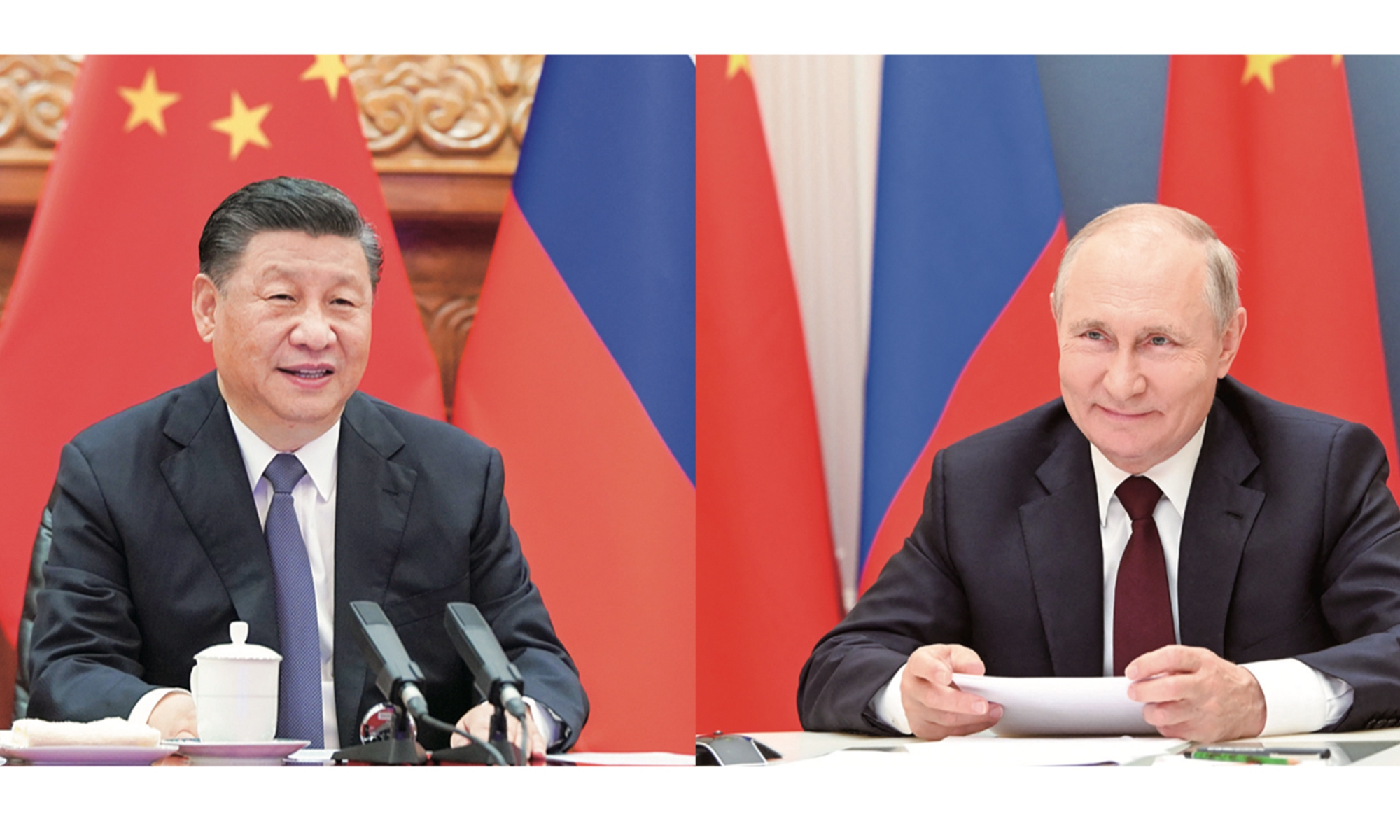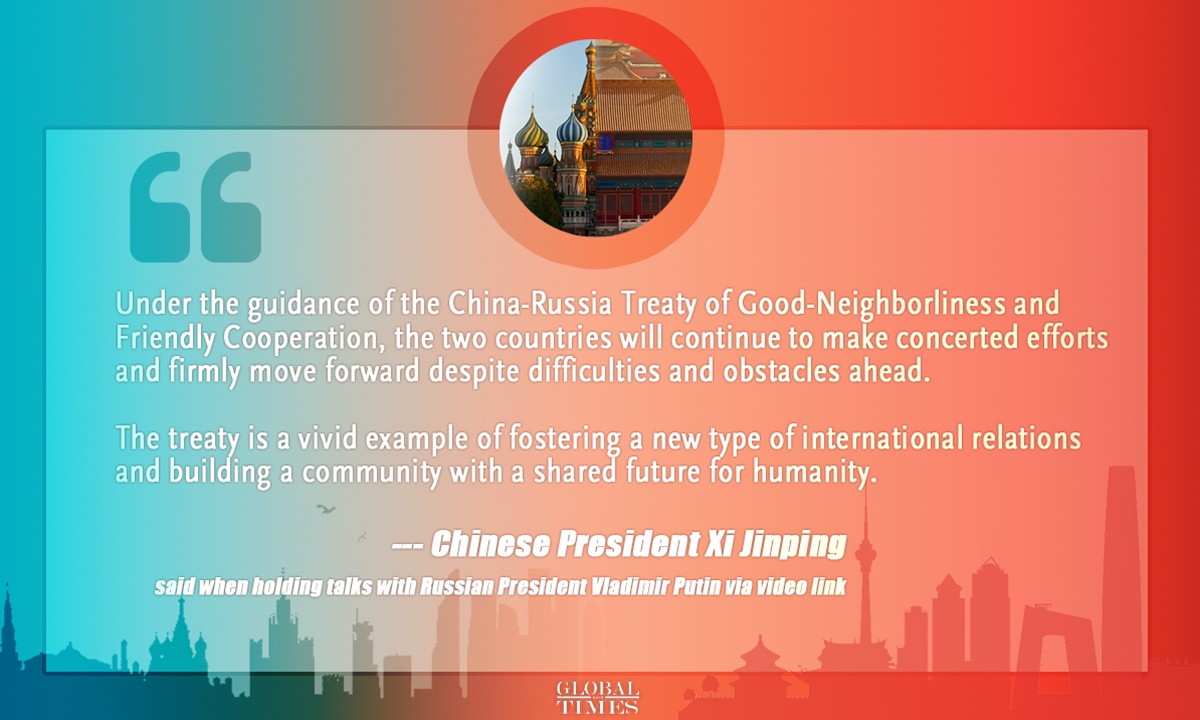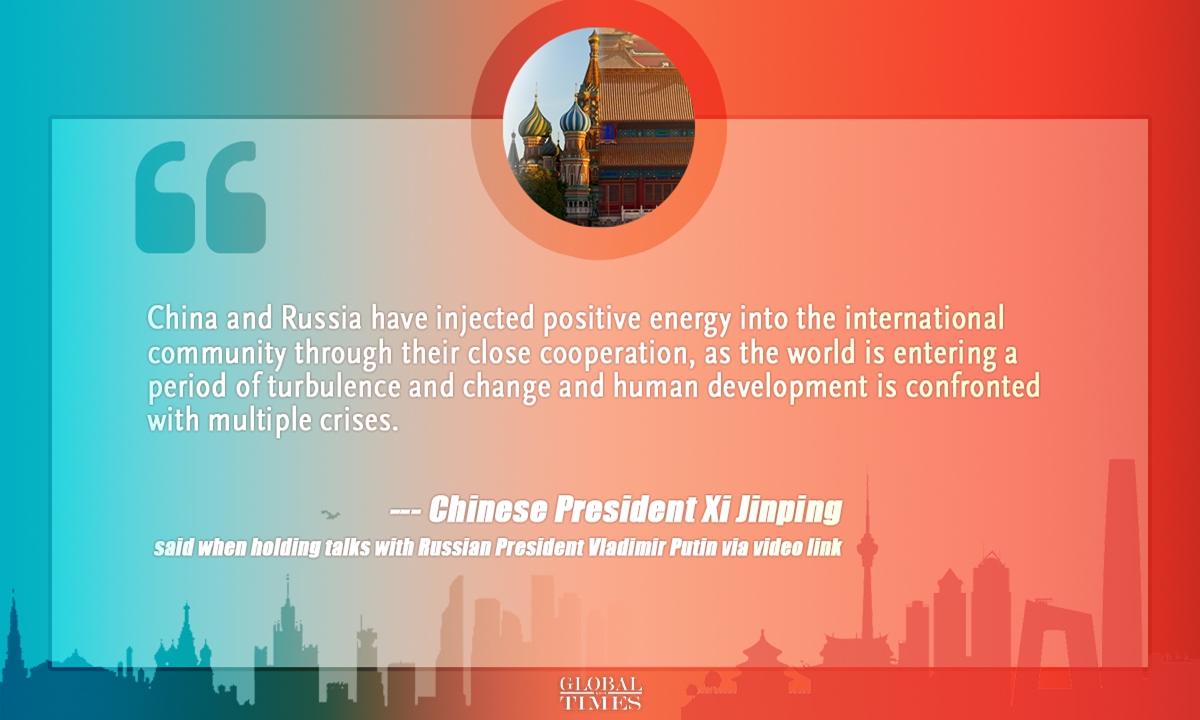
Chinese President Xi Jinping and Russian President Vladimir Putin hold talks via video link on Monday. The two leaders issued a joint statement during the event, officially deciding to extend the China-Russia Treaty of Good-Neighborliness and Friendly Cooperation. Photos: Xinhua, AFP
Chinese President Xi Jinping and Russian President Vladimir Putin jointly announced the extension of the China-Russia Treaty of Good-Neighborliness and Friendly Cooperation on Monday, three days ahead of the centennial of the Communist Party of China (CPC), while Putin congratulated Xi on the CPC's centenary and expressed hopes for enhanced China-Russia inter-party exchanges.
The extension of the treaty - a vivid example of a new type of international relations - and such frequent interactions between the top leaders of the world's two major powers are also widely seen as a direct response to doubts in the West over China-Russia relations as the US seeks to align its allies to confront them both, and even split the ties, Chinese experts said.
The joint statement was made during talks between the two heads of state via video link on Monday.
The treaty aligns with both countries' fundamental interests, echoes the themes of the times of peace and development, and is a vivid example of fostering a new type of international relations and building a community with a shared future for humanity, Xi said.
"China and Russia have injected positive energy into the international community and set an example of a new type of international relations through their close cooperation, as the world is entering a period of turbulence and change and human development is confronted with multiple crises," the Chinese President said.
The 5,000-word joint statement issued by China and Russia with some new descriptions about China-Russia relations echoed the fact that the bilateral ties have reached their best period.
Russia needs a prosperous and stable China while China needs a strong and successful Russia and the two sides see each other as partners of priority in order to deepen the coordination and cooperation in various domains including politics, security, military, trade, cultural exchange and international affairs, according to the statement.
The joint statement also expressed a common stance on arms control issues. Both sides expressed opposition to the unilateral sanctions and to some countries using the excuse of "democracy" and "human rights" to interfere in other countries' internal affairs, showing mutual respect to the political system and path they chose.
The latest meeting was the second interaction between the top leaders of the two countries in six weeks after they witnessed the groundbreaking ceremony of a bilateral nuclear energy cooperation project on May 19.
The frequent interactions between top leaders of the two countries showed deepening mutual trust and delivered a heavy blow to Western attempts to split China-Russia friendship with the timing carrying on a special significance shortly after the Biden-Putin talks and before the CPC celebrates its centennial. Such high-level mutual trust distinguishes the China-Russia relationships from that of others, especially from the Western bloc, and this relationship can be adjusted in accordance with the needs of the time, experts said.

Infographic:GT
Significance of the timing Putin congratulated Xi on the CPC's centenary and said Russia has valued exchanges with the CPC in history and hoped to enhance inter-party exchanges with it. He also expressed hope that under CPC leadership, China will make new achievements in social development and play more important role in international affairs.
Xi also thanked Putin and various sectors from Russia for expressing congratulations on the centenary of the founding of the CPC, reiterating that China firmly supports Russia to take effective measures in safeguarding the country's long-term stability.
The online meeting coincided with the 20th anniversary of the signing of Russia-China Treaty on Good-Neighborliness and Friendly Cooperation, according to a statement from the Kremlin. The treaty was initially signed by former Chinese leader Jiang Zemin and Putin on July 16, 2001.
Against the backdrop of the COVID-19 pandemic and hostility from the West, Xi and Putin's video meeting shows the two countries' resolve to deepen bilateral ties and work together to safeguard global strategic stability, according to Chinese experts.
The meeting between Biden and Putin on June 16 ended with no significant breakthroughs, though it had shown that US-Russia tensions have eased a little bit. But the global focus has been on whether this meeting will change the course of China-Russia relations as the US media speculated whether the Biden administration could successfully divide the Russia-China partnership - a growing threat to Washington, some analysts have said.
The timing of this online meeting shows that the two leaders attach great importance to the bilateral ties and high-level strategic partnership, Yang Jin, an associate research fellow at the Institute of Russian, Eastern European and Central Asian Studies under the Chinese Academy of Social Sciences, told the Global Times.
"As Russia's top leader, Putin is sending sincere greetings to Xi, who is also general secretary of the CPC Central Committee, which shows China-Russia ties would be deepened without being affected by other great power ties, Yang said.
Chinese State Councilor and Foreign Minister Wang Yi on June 1 said that the treaty has shaped a new type of major power relationship between China and Russia in the past 20 years.
"The two sides have always taken mutual support as the fundamental way to get along with each other, mutual benefit and win-win cooperation as the core principle of cooperation, China-Russia friendship as the most precious thing to be passed on from generation to generation, and safeguarding peace as their paramount international responsibility," Wang said.
At the time of signing the treaty, both Russia and China faced issues of transition in complicated international relations. Long before the 9/11 terror attacks, wars happened in the Middle East, including the Gulf War. After 9/11, the US and the West had ramped up interference in the Mideast and caused regional turmoil. Russia has faced great pressure from the West, including the NATO's expansion to the East as well as the scramble for sphere of influence in Central and Eastern Europe, Yang noted.
China also faced challenges on development and security, especially in the security field - how to defend its western regions and deal with problems in the South and East China Seas.
Under this background and based on mutual needs, China and Russia signed the treaty. The equality not only contains mutual respect of each other's political position, but also respect of each other's choices. "These have contributed to the smooth and stable development of China-Russia ties and it has been 20 years since the signing of the China-Russia treaty, and the two have set a good example for building a new type of major power relations to the international community," Yang said.
Before the video conference between Xi and Putin on Monday, many Russian media covered what the deputy head of the International Department of the CPC Central Committee Guo Yezhou said on Monday. When answering a question by Russian news agency TASS, Guo pointed out that the Chinese leadership believes that Russia will be developing successfully under Putin.
Another Russian news agency RIA published an article the same day, looking back at the development of official relations between China and Russia. "Russia-China relations are characterized by high dynamics of development, a solid legal basis, an extensive organizational structure and active ties at all levels," summarized RIA.

Infographic:GT
Find their own path Both the 20th anniversary of the treaty and the 100th anniversary of the CPC are very important events not only for Russia and China, but for the world, which not only created a political platform for enhanced cooperation of our countries, but also seriously influenced the development of Eurasia, Victor Larin, an academician and principal researcher at the Russian Academy of Sciences, told the Global Times on Monday.
The online meeting between Putin and Xi after the Putin-Biden summit means Russia and China will have to "synchronize watches" and work out a common program to counter the growing pressure of the "collective West," Larin said.
The West is escalating confrontations with China and Russia in all areas, including the economy. But with the involvement of NATO, military conflicts are possible. Among all these triangle relations, China-Russia ties work as a stabilizer, some experts said, noting that the past experiences of the both countries showed that mutual respect is the foundation of an equal relationship between the major powers.
Although China and Russia are not allies, there is no ceiling as to how far their cooperation can go. Their relationships have developed in tune with the times, Wu Enyuan, a research fellow at the Chinese Academy of Social Sciences, told the Global Times.
The video meeting between the two leaders is not targeting any third party. But given the recent situations, including that US and the West ramping up efforts to sanction Russia, and the conflicts between Russia and the UK in the Black Sea, it is very significant and necessary for leaders of China and Russia to make this meeting, Wu said.
The treaty states that China and Russia shall have regular meetings at all levels to conduct periodic exchanges of views and coordinate their stand on bilateral ties on important and urgent international issues.
"For the past 20 years, the treaty has been carried forward very well and the two sides will also further adjust it in accordance with changes of the international situations," Wu said.
Xia Wenxin also contributed to the story






